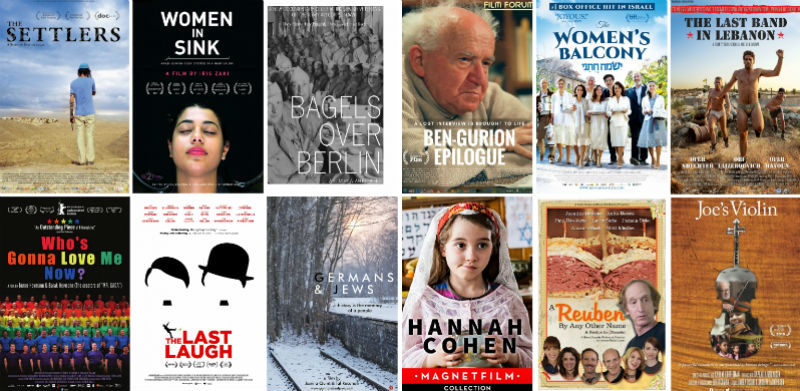A journey through the 2017 Ann Arbor Jewish Film Festival

The 16th annual Ann Arbor Jewish Film Festival opens Sunday, May 7, and runs through Thursday, May 11. Sponsored by the Jewish Community Center of Greater Ann Arbor, planning for the five-day festival began in November 2016.
“We have a committee of 23 individuals who help decide on the films,” said Karen Freedland, the JCC’s cultural arts director and festival coordinator. “We start with a list of over 95 titles and whittle it down to 40 films we think look the strongest. From there we try to get from the distributors as many of those 40 films to screen, and we narrow it down to the 13 we have chosen.”
Save for one, the films in this year’s festival are very recent, most from 2016. "We try to get the most current releases available and that sets us apart from some other festivals who will show films that we had shown the year before," Freedland said. "We are lucky that we work with Brian Hunter from the Michigan Theater. He helps us source out some of the latest films that are geared for a Jewish film festival.”
Freedland said one of the festival's goals is to present a wide variety of film styles -- “We try very hard to have a balanced selection of dramas, documentaries, and comedies” -- and about a third of this year’s offerings have themes related to the Holocaust, which “is typical for a Jewish Film Festival,” she said. “There are new films coming out regularly with Holocaust themes or stories that continue to keep the topic relevant, which is so important.”
Nearly a thousand people attend the festival every year, and while “it is definitely a stronger Jewish attendance,” Freedland said, “we always try to reach out to the entire Ann Arbor community to attend. With these films, there are universal themes that connect with everyone, and you do not have to be Jewish to appreciate or relate to any of them.”
Freedland said she has no favorites among this year’s offerings but pointed out, “What is different this year is we have a shorts program on Thursday, May 11, at 5 pm. There are five short films and each one is unique and powerful. Shorts can really bring home a message or story very quickly. The committee enjoyed selecting that program very much.”
Freedland arranged for me to preview two of this year’s festival films, Mamele and Fanny’s Journey.
Mamele is a digitally restored edition of the classic Yiddish-language film with English subtitles starring Molly Picon, one of the most illustrious names in Yiddish theater. Picon made her stage debut in 1912 and was so famous and beloved among Yiddish theater and movie fans that her name on a marquee or a movie poster all but guaranteed success. When Yiddish theater faded in the late '40s, Picon made the transition to English movies and TV shows, again achieving renown but this time with a mainstream audience. She appeared alongside Frank Sinatra in Neil Simon’s Come Blow Your Horn in 1963 and in the 1971 film adaptation of Fiddler on the Roof where she played -- nu, what else -- Yente the matchmaker.
Mamele (Little Mother), made in Poland in 1938, followed one of Picon's best-known Yiddish films, Yidl Mitn Fidl (Yiddle With His Fiddle), also made in Poland two years earlier. Mamele’s predictable plot and weak supporting cast are more than compensated for by Picon’s brilliant acting, singing, and comedic abilities. The film is set in Łódź and was the last Jewish film made in Poland before the Nazis invaded in September 1939. It is simultaneously an entertaining movie featuring a major talent and a precious artifact preserving a place, a vibrant culture, and a people just before they were destroyed forever.
Fanny’s Journey is a 2016 French drama with English subtitles based on the true story of Fanny Ben-Ami, a 12-year-old girl who took care of her two younger sisters and, eventually, a handful of other children who were separated from their families during the Nazi occupation of France. It’s not giving away too much to disclose that this small band of children, after a number of harrowing trials, thrilling escapes, and a few heartwarming incidents, eventually make their way to safety in Switzerland.
Every Holocaust story is unique, yet each one often also shares common elements with all others. Fanny’s Journey is like that. The children’s one-of-a-kind adventures, close calls, and strokes of luck are distinctive and matchless, but their suffering, courage, and creativity, as well as the cruelty of their tormentors and the humanity of some of the people they encounter, are themes found in many Holocaust tales. They are woven together artfully in Fanny’s Journey and fill every frame of this unforgettable film.
Sandor Slomovits is an Ann Arbor-based writer and musician known for his work in Gemini and San & Emily.
The two showings of “Fanny’s Journey” on Sunday, May 7, the first day of the festival, will take place at the Rackham Amphitheater on the 4th floor of U-M’s Rackham School of Graduate Studies. The rest of the festival films will be shown at the Michigan Theater. For the full schedule and further info, visit film.jccannarbor.org or call 734-971-0990.


































